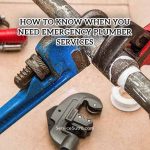Water damage is an unfortunate reality for many homeowners. Whether it’s caused by broken pipes, leaks in the roof, or flooding from sources outside your home, water damage can devastate your property and possessions. The good news is that with proper planning and preventive maintenance, you can keep most water-related disasters at bay and protect your family from costly damages and disruptions to their daily lives.
Consider these steps.
1. Check Your Appliances Often
Over time, these systems can wear down and become malfunctioning, leading to leaking pipes or inefficient drainage. Regular maintenance and repairs on your HVAC system can keep it running smoothly and help you avoid costly repairs due to water damage. Additionally, checking for worn-out hoses and faulty connections in other appliances such as dishwashers, washing machines, toilets, and other related items can save you from serious harm in the long run.
Taking preventative measures when it comes to your home is key to making sure you don’t suffer from costly damage caused by water issues. The best way to avoid costly water damage is to replace faulty parts as soon as possible. Your HVAC system can also show signs of water damage, so check your air conditioner and heater for any signs that water is seeping into the system.
2. Inspect Your Roof and Gutters
Your roof and gutters are your first line of defence against water damage, so it’s important to inspect them regularly for signs of deterioration or blockages that could lead to leaks or flooding. Make sure to clear out any debris or leaves that have accumulated in your gutters to allow water to flow freely.
You can have the inspections done by a professional or do them yourself. A mold restoration company can also help you inspect your roof and gutters to ensure they are in good condition. They can also advise you on ways to prevent water damage.
3. Address Humidity Issues
Excess moisture and humidity can also cause water damage in your home. Be sure to use a dehumidifier in any areas of your house that tend to be damp or humid such as the basement, crawl space, attic, or bathrooms. You can also install a ventilation system to reduce indoor air moisture levels.
For rooms that are especially prone to moisture, such as bathrooms and kitchens, you can install a humidity detector or hygrometer to monitor the humidity levels in your home. If the readings reach above 70%, it’s time to take action to reduce the moisture levels before water damage can occur.
4. Install a Sump Pump
A sump pump is a great way to protect your home from flooding due to heavy rains or other water sources. A sump pump can be installed in the lowest part of your basement and pump any excess water out before it can cause damage. It’s essential to check your sump pump regularly to make sure it is working properly. You should also consider installing a battery-operated backup in case of power outages or system failures. The cost of a sump pump is far less than repairing water damage.
5. Check Pipes for Leaks
Broken or leaky pipes can also cause extensive water damage in your home if not detected and repaired quickly. Inspecting your exposed piping regularly inside and outside your house is essential. If you notice any signs of a leak, it’s vital to act quickly and have the damage repaired.
You should also regularly inspect your gutters, downspouts, and other parts of your home’s drainage system to ensure they are free of clogs and debris. If you find a clog or blockage in the drainage system, it’s crucial to take care of it immediately to avoid water damage. During winter, it’s important to check your pipes for signs of freezing or bursting.
6. Check Your Water Bill
A sudden increase in your water bill could indicate a leak somewhere in your home. If you notice any sudden changes or an unusually high bill, it’s critical to investigate further and find the source of the problem. Leaks often occur in areas that are not easily accessible such as behind walls and under floors, so if you suspect a water leak, it’s best to call in a professional plumber to inspect your home and locate the source of the problem.
7. Get Professional Help
If you suspect water damage, it’s best to hire a professional restoration company that can assess the situation and help you repair any damage. They can also advise you on how to prevent future damage from occurring. Water damage is nothing to be taken lightly and should always be addressed quickly in order to avoid long-term problems. Following these tips will help you protect your home from water damage and keep your family safe.
Following these tips should help you prevent water damage in your home. However, it’s still important to be vigilant and inspect your property regularly for signs of potential flooding or water-related issues. If you notice any problems, act quickly and have the issue addressed before it leads to further damage.






